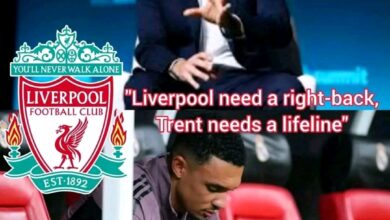Jamie Carragher gives clear Liverpool red card verdict after Alexis Mac Allister VAR controversy

On a Sunday afternoon at Turf Moor, a football game that was supposed to be about Liverpool’s unbeaten start to the Premier League season turned into a match full of drama, controversy, and pain. It was not just about the goals, the possession, or the missed chances. It was about one single moment in the 16th minute when Alexis Mac Allister went down clutching his ankle after a heavy challenge from Burnley’s Lesley Ugochukwu. The tackle left Liverpool fans furious, their manager Arne Slot anxious, and the whole of Anfield’s global fanbase arguing online about whether justice had really been served by referee Michael Oliver and VAR.
The incident came early in the game when Liverpool were trying to take control against a Burnley side that was defending deep and looking to hit on the counter. Ugochukwu, known for his physical style of play, lunged into a tackle with the Argentine midfielder. He touched the ball, yes, but his follow-through was wild and reckless, landing straight on the side of Mac Allister’s ankle. The Argentine, who had only just recovered from a knock the previous week, screamed in pain as he rolled on the Turf Moor grass. The Liverpool players immediately surrounded the referee, waving their arms, demanding a red card. The fans in the away end also rose to their feet, chanting furiously and shouting for justice.
But Michael Oliver, one of the most experienced referees in England, stood firm. He reached into his pocket and produced a yellow card. No hesitation. No long pause. No confusion. Straight yellow. Liverpool fans could not believe it. They wanted red. They demanded red. And when VAR checked the incident, there was a tense pause inside the stadium. The crowd waited, the players waited, even the commentators paused mid-sentence. But after a quick review, VAR agreed with Oliver’s original decision. It was yellow and nothing more.
Jamie Carragher, watching from the Sky Sports studio, knew immediately that this decision was going to dominate conversations after the match. Carragher, who has built a reputation for his blunt honesty, made it clear that in his opinion, Michael Oliver had made the right call. “It’s the follow-through,” he explained on live TV. “He wins the ball, yes, but the follow-through catches Mac Allister. If he’s six inches higher then it’s a massive problem, maybe even a leg breaker. But he caught him on the boot, on the ankle. Painful, sore, yes, but for me, yellow card is the right decision. We saw a red card yesterday in the West Ham game when the player was at full stretch and couldn’t stop himself. This one is different. This is yellow.”
Carragher’s words might have been calm, but the reaction among Liverpool supporters was anything but calm. Social media exploded within minutes. Clips of the tackle spread across Twitter, Instagram, and TikTok. Fans posted slow-motion replays, circling Ugochukwu’s studs, showing Mac Allister’s twisted ankle, and demanding answers. Some fans accused VAR of protecting Burnley. Some accused Oliver of being too soft. Some even suggested that if it had been a Liverpool player making that tackle, the card would have been red without any hesitation.
Mac Allister himself tried to carry on after receiving treatment from the Liverpool medical staff. He hobbled, he limped, but he continued. That resilience drew applause from the travelling fans, who chanted his name as he got back to his feet. But every time he touched the ball, Burnley players closed him down quickly, testing his ankle, testing his balance. It was clear he was not moving as freely as usual. Yet he fought on because that is what Liverpool players under Arne Slot have been told to do: fight until the very last minute, never give up, never show weakness.
For Arne Slot, who is still in his first few months as Liverpool manager, the incident was more than just a challenge. It was a test of his team’s mentality. Could they keep calm after what they saw as an injustice? Could they focus on breaking down Burnley’s stubborn defence instead of wasting energy on arguments with the referee? For much of the first half, the answer seemed to be no. Liverpool had possession, yes, almost 70% at one point, but possession without goals means little. Ten shots in the first half, only one on target. And that one on target came from Andy Robertson, who wasn’t even supposed to be on the pitch so early.
Robertson had replaced Milos Kerkez in the 38th minute after the young left-back endured a nightmare spell. The Scotland captain’s energy lifted Liverpool a little, and he even made a darting run into the Burnley box to test goalkeeper Martin Dubravka. But the shot was weak, straight at the keeper, and Burnley breathed again.
Meanwhile, Burnley grew in confidence. Every Liverpool miss made them stronger. Every misplaced pass gave them hope. They were not dominating possession, but when they countered, they looked sharp. Their forwards ran at Liverpool’s defence with speed, trying to exploit the spaces left behind when Robertson and Trent Alexander-Arnold pushed forward. The Turf Moor crowd, small compared to Anfield but loud and passionate, roared their team on.
The game itself was not just about football anymore. It was about emotions. Every time Mac Allister touched the ball, the fans in red feared another tackle would follow. Every time Ugochukwu went near him, boos filled the air. It was as if the tackle had created its own story within the game. And that story carried all the way through to half-time.
By the time the whistle blew for the break, the conversation was still dominated by that single incident. Commentators debated it, pundits dissected it, fans argued endlessly. And even though Jamie Carragher gave his calm explanation that a yellow was the right decision, not everyone agreed. Some experts sided with Carragher, saying the game would lose its edge if every follow-through was punished with a red. Others said safety must always come first, and that referees must protect players like Mac Allister from dangerous tackles.
It was a debate with no easy answer, because football has changed. VAR has changed it. Referees are under more pressure than ever to get every decision right, and still, even with replays from five different angles, even with slow-motion, even with a whole team of officials watching, people still disagree. This was another example.
In the second half, Liverpool tried to respond. They pushed forward with more intensity. Alexander Isak, who was expected to lead the line, was not in the squad, which left Darwin Núñez with the responsibility to score. But Darwin, like in many games before, was full of energy but lacking the finishing touch. He had chances, yes, but none of them really troubled Dubravka.
The story kept circling back to Mac Allister. Would he last the 90 minutes? Would his ankle hold up? Every sprint, every challenge, every twist seemed to make Liverpool fans nervous. They had already seen him suffer one bad injury earlier in the year. Losing him again would be a huge blow, not just for this game, but for the whole season.
Jamie Carragher continued his analysis after the game, repeating his point that football is a contact sport and that not every painful tackle should be a red card. He warned fans not to let emotions cloud their judgment. “It’s always going to hurt when you see your player down in pain,” he said. “But the laws of the game are the laws. This wasn’t dangerous enough for a red.”
But Liverpool fans don’t always listen to logic when emotions are high. For them, it was about protecting one of their midfield leaders, about ensuring that referees treat their players with the same respect and protection as any other. For them, this was not just about a yellow or red card—it was about fairness.
And so, what should have been remembered as a straightforward game in which Liverpool aimed for their fourth straight win, will now forever be remembered for the Alexis Mac Allister moment. For the pain on his face. For the chants from the away end. For the fury online. For the debate that will rage for days. For the words of Carragher, calm but controversial in their own way.
Football is full of moments like this, moments that divide opinion, moments that create stories bigger than the game itself. This was one of those moments. And whether you believe Oliver was right or wrong, whether you agree with Carragher or not, one truth remains: Alexis Mac Allister will carry the scars of that challenge long after the whistle blew at Turf Moor. And Liverpool fans will not forget it.
This game was supposed to be about points, about goals, about extending a winning run. Instead, it became a game about pain, about controversy, about VAR, about referees, about the fragile line between a hard tackle and a dangerous one. And that is why, weeks from now, nobody will remember how many corners Liverpool had or how many passes they completed. They will only remember the tackle, the yellow card, and the debate that followed.















